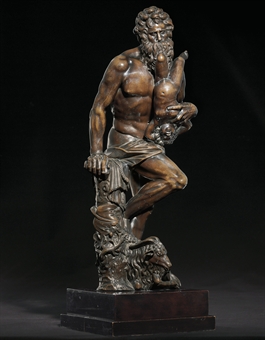I visited Suzanne Wenger, known as priestess Adunni Osun, at Osogbo and have a metal fish pendant she gave me. She died on January 12, 2009.
To resort to my favourite summation of her experience: she came, she saw and was conquered. An internal, as yet undefined spiritual quest, too personal for outsiders to understand, had come to fulfilment, and there was no turning back. I glimpsed this phase of illumination at our very first meeting, all the way back in the early sixties.
Thinking of Fela at the time of Susanne’s passing comes to me quite naturally, quite apart from the fact that I did try to induce Fela to visit Osun on a few occasions, confident that he might thereby deepen his affinity to the Yoruba world.
There were quite a few similarities – and contrasts – between her and my cousin, who came to be known even more widely as abami eda.
Both created their own worlds – communalistic in temper, internally regulated, and defended with a passion. Both were ardent promoters of Yoruba culture, although, in Fela’s case, he had a generally permissive cultural amalgam that went by the name ‘African culture’.
There, perhaps, the convergence ends. Susanne’s cultural space was a space of tranquility and meditation that transmitted a unique aura.
She hated showmanship, and was somewhat reproachful of Fela’s treatment of a shared resource, her eyes being always tuned inwards, communing with her private Muse in a secretive zone filled with images, with intimations of godhead, constantly homing in on what would be the guiding passage from her history and cultural antecedents to this world that reached out to her so compulsively.
She found that passage in the depths of Osun, and Osun became not merely her physical, creative retreat, but her spiritual refuge and inspiration.
Let this be clearly stated; Susanne Wenger never attempted nor pretended to be Yoruba. Even in her very last interviews, she took pains to stress this.
She was European, Austrian, yet a being of the universal spirit who found the truths of existence not in Europe, nor Austria, but in a place she had never heard of until brought thither in the most ordinary of circumstances.
Yet she recognized that space at once, intuitively, unquestioning. Austria lost an artist; Oshogbo gained one, a spiritual seeker and guide, community leader – despite herself – and creative mentor all in one.
No community imbued with any cultural pride and self-confidence in its authentic heritage, yet with openness to the offerings of external insights, could ask for more. The symbiotic relationship could proceed, at its own pace, and unfettered.
There is a lesson in this for all of us, viewed conversely. There is nothing strange in Africans, with their wealth of spiritual and cultural resources, seeking or voluntarily embracing spiritual affinities anywhere – from Rome to Mecca, from Jerusalem to Canterbury.
It is when these latter-day convertites assume the mantle of Absolute, Incontrovertible Truths to the extent that they affect to despise other Truths, destroy their icons, mutilate their heritage and embark on orgies of intolerance, even to a homicidal extent, that they declare themselves subhuman, and earn the righteous wrath of other claimants to the altar of spiritual verities.
Susanne Wenger, re-named Adunni Olorisa, mapped out the path of tolerance, of spiritual ecumenism, the choice of being true to oneself yet accommodative of others.
All she demanded, indeed insisted upon, was the sanctity of the spiritual space of her adoptive community. Let the warring dacoits of foreign deities take note, and place a check on their fanaticisms and bigotries. Believe and worship what you will, but let others also believe, and worship in their chosen mode.
What the Africans took to, and continues to thrive within nations such as Brazil, Cuba, Columbia and other Caribbean communities on island and landmass, Adunni-Osun found by accident – or guidance – in its original home, the abode of the orisa.
She dedicated her life to enhancing a preserve that spoke meaningfully to her, enabling a community of creative minds and hands in various genres, protecting, exploring and expressing outwardly the eternal essence of its sacred grove with the reverence of the imaginative spirit.
Such creative devotion does not fail to renew the spiritual dimension that lies at the heart of all religions, by whatever names they are called, and whatever their claims to world status in the directory of religions.
Adunni-Osun is how integrated she surfaces in my recall of her. She conveyed a variety of emotions, lessons, unresolved intimations to many, black, white, or bronze, from within the Nigerian nation space and from far distant lands, not excepting even tourists for whom she had little toleration.
For all however, this irreducible mantra, epitomized by the career of a questing stranger who came, saw, and was conquered:
“Go to the orisa, learn from the orisa, and be wise.”














